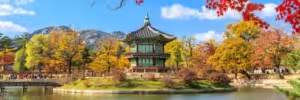The Republic of Korea
South Korea, officially known as the Republic of Korea, is a fascinating East Asian nation that seamlessly blends ancient traditions with modern innovation. Situated on the southern half of the Korean Peninsula, South Korea shares borders with North Korea to the north, the Yellow Sea to the west, and the Sea of Japan (East Sea) to the east. With a population of over 51 million people, South Korea is a bustling, dynamic country that offers visitors a diverse range of experiences.

One of the most striking aspects of South Korea is its dramatic landscape. From the rugged mountain ranges of the Taebaek and Sobaek mountains to the stunning coastlines of the East and South Seas, the country is blessed with natural beauty. Seoraksan National Park, located in the northeastern part of the country, is a popular destination for outdoor enthusiasts, offering hiking trails, waterfalls, and panoramic views of the surrounding mountains. Meanwhile, the volcanic island of Jeju, located off the southern coast, is renowned for its picturesque beaches, lava tubes, and unique flora and fauna.
In addition to its natural wonders, South Korea is also home to vibrant cities that pulse with energy and excitement. The capital city of Seoul, with its population of over 10 million people, is a bustling metropolis that seamlessly blends modern skyscrapers and ancient palaces. Visitors to Seoul can explore historic sites such as Gyeongbokgung Palace, the largest of the Five Grand Palaces built during the Joseon Dynasty, or wander through the bustling streets of neighborhoods like Myeongdong and Hongdae, known for their shopping, dining, and nightlife.
Beyond Seoul, South Korea is home to several other cities that offer their own unique attractions. Busan, located on the southeastern coast, is South Korea’s second-largest city and also is famous for its beaches, seafood markets, and bustling port. Incheon, located west of Seoul, is a major transportation hub and is home to Incheon International Airport, one of the busiest airports in the world. And Daegu, located in the southeast of the country, is known for its rich cultural heritage, historic sites, and vibrant arts scene.
One of the hallmarks of South Korean culture is its rich and diverse cuisine. Korean cuisine is characterized by its bold flavors, use of fermented ingredients, and emphasis on fresh vegetables and seafood. Staples of the Korean diet include rice, kimchi (fermented vegetables), bulgogi (marinated beef), and bibimbap (a mixed rice dish topped with vegetables, meat, and a spicy sauce). Street food is also popular in South Korea, with vendors selling everything from hotteok (sweet pancakes filled with brown sugar and nuts) to tteokbokki (spicy rice cakes) on bustling street corners and markets throughout the country.
In addition to its culinary delights, South Korea is also known for its rich cultural heritage. Traditional Korean music, dance, and art forms such as pansori (a form of narrative singing), samulnori (percussion music), and hanbok (traditional clothing) are still practiced and celebrated today. South Korea is also home to a thriving contemporary culture scene, with K-pop music, Korean dramas, and Korean cinema enjoying global popularity.
In conclusion, South Korea is a country of contrasts, where ancient traditions coexist with modern innovation, and natural beauty meets urban excitement. From the bustling streets of Seoul to the serene landscapes of Jeju. South Korea offers visitors a rich tapestry of experiences that are sure to leave a lasting impression. Whether you’re exploring historic palaces, sampling delicious street food, or hiking through pristine wilderness, South Korea has something to offer everyone.
Do you want to know more about South Korea?
South Korea Best destinations (destinyanddiscovery.com)
